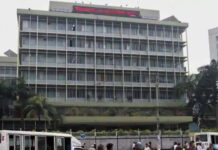
Rohingya refugees who arrived from Myanmar on Friday night by boat, walk on the road of Shah Porir Dwip as they move to a refugee camp in Teknaf on Saturday. — Reuters photo
Makeshift camps of Rohingyas entering Bangladesh to flee violence in Myanmar continued sprouting up everywhere in Cox’s Bazar, especially on hill slops and in reserved forests, exposing the ethnic minority people of Myanmar to severe life-threatening condition.
Local people said that Rohinagys were still making makeshift shelters at Shamalpur, Kerantoli, Ali Khali, Jamtoli, Chakmaghata, Raikhang, Hakimpara, Moiner Ghona, Tasnimar Khola and other places in forests and far away from new under construction mega camp at Balukhali while their influx into Bangladesh continued on Saturday.
Forest department officials said that Rohingyas already occupied 2,900 acres of forest land and totally destroyed the forest of half of the area felling all trees to make makeshift shelters and wood for cooking and their presence in the area was on the rise.
The Bangladesh government planned to expand a camp at Balukhali known as Kutupalang camp extension near the border town of Cox’s Bazar to accommodate all Rohingyas fled to Bangladesh.
Two thousand acres of land next to the existing Kutupalang camp were set aside in September for the Rohingya new arrivals. As the number of newcomers exceeded 500,000 –– adding to 300,000 already in Bangladesh –– another 1,000 acres were allocated for the new mega camp.
‘We will bring all Rohingyas living far away from Balukhali area to control the situation,’ said Cox’s Bazar refugee relief and rehabilitation commissioner Mohammad Abul Kalam.
‘We are yet to make a decision regarding bringing Rohingyas living in Hakimpara, Moiner Ghona, Tasnimar Khola areas as they were close to Balukhali,’ he said.
According to UN estimation, 515,000 Rohingyas arrived in Bangladesh from Rakhine state of Myanmar in the past six weeks in the new influx what the United Nations called the world’s fastest-developing refugee emergency.
Officials estimated that the new influx already took to 9.33 lakh the number of Myanmar people living in Bangladesh.
The ongoing influx began after Myanmar security forces responded to Arakan Rohingya Salvation Army’s reported attacks on August 25 by launching a violence that the United Nations denounced as a textbook example of ethnic cleansing.
Terrified, half-starved, exhausted Rohingyas continued arriving in Bangladesh in groups trekking through hills and crossing rough sea and the River Naf on boat and taking shelter wherever they could in Cox’s Bazar and Bandarban.
Many Rohingyas took shelter at makeshift camps in reserved forests, felling trees, setting up shanties on hill slopes while some of them took shelter at overcrowded registered and unregistered camps.
UN and international agencies’ situation report on Friday said that of the Rohingya new arrivals, 1,97,000 took shelter at Balukhali, Kutupalang, Ledha and Shamlapur makeshift camps and Kutupalang and Nayapara refugee camp, 2,25,000 at spontaneous shelters at Moinar Ghona, Thangkhali, Unchiprang, Tasnimar Khola, Patibunia in Cox’s Bazar and 91,000 at places of host communities at Ramu, Teknaf and Ukhia of Cox’s Bazar and Naikhyangchari in Bandarbhan.
About 2,25,000 of new arrivals were living in new spontaneous settlements with very limited water, sanitation and hygiene infrastructure due to an absence of planning,’ said UNICEF in a statement on Friday.
Divisional forest official in Cox’s Bazar (south) Ali Kabir said that Rohingyas made makeshift camps on 2,900 acres of forest land in Balukhali, Kutupalang and adjacent areas.
‘They have destroyed all trees of about 1,500 acre forests for making makeshift shelters and fuel wood,’ he added.
Ali Kabir said that the deforestation might intensify the conflict between humans and elephants in the area, as it was one of the safe channels for the movement of elephants, Ali Kabir said
Aid workers said that scattered living of Rohingyas was one of the challenges for them to reach all Rohingyas.
Forest officials said that as the rampant hill cutting and deforestation weakened the soil structure and heavy downpour for days made the situation more vulnerable.
‘Anything disastrous can happen anytime,’ warned Cox’s Bazar (south) assistant conservator of forest Dewan Md Abdul Hye Azad.
About 20,000 Rohingyas taking shelter on hills at Ali Khali several kilometres west from Nhila of Teknaf continued half-starving as no relief materials yet reached there.
These Rohingyas took shelter in late August and were so far living on assistance provided by the local communities.
They said on Saturday that a group of army members distributed tokens for relief among them on the day. Cox’s Bazar additional magistrate Khaled Mahmud, also focal person Rohingyas issue of the district administration, said that they were looking into the matter.
Local people said that Rohingyas continued entering Bangladesh. Bangladeshi fishermen on Saturday said that many ethnic minority Myanmar nationals gathered on the bank of the Naf River on Myanmar side opposite to Ulubunia and Lambabil in Bangladesh.
An estimated 2,000 Rohingyas were arriving in Bangladesh every day, International Organisation for Migration said in a statement on Friday, adding, ‘observers believe that as many as 100,000 more people may be waiting to cross into Cox’s Bazar from North Rakhine’s Buthidaung Township.’
Reuters reported from Yangon that Rohingya insurgents said on Saturday that they were ready to respond to any peace move by the Myanmar government but a one-month ceasefire they declared to enable the delivery of aid in Rakhine state was about to end.
The Arakan Rohingya Salvation Army did not say what action it would take after the ceasefire would ended midnight on Monday but it was ‘determined to stop the tyranny and oppression’ waged against the Rohingya people.
‘If at any stage, the Burmese government is inclined to peace, then ARSA will welcome that inclination and reciprocate,’ the group said in a statement.
Government spokespersons were not immediately available for comments. When the ARSA announced its one-month ceasefire from September 10, a government spokesperson said, ‘We have no policy to negotiate with terrorists.’
Source: New Age









